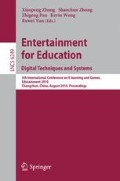Abstract
Multi-touch technology offers us a new opportunity to develop digital educational games (DEGS) for children. Current researches are focusing on the area of cooperative learning, and the devices used are mostly horizontal. Can we develop competitive DEGS for children? How would it look like if these games are shown on vertical screens? Based on these assumptions, we did some experimental development researches. In this paper, the design and implementation of four competitive DEGS are introduced, each of which targeting a specific kind of intelligence (verbal-linguistic, logical-mathematical, musical and visual-spatial) based on the theory of multiple intelligences. Tryout was made on some preschool children and the problems encountered are analyzed. The experiences gained in the whole process are summarized in the end.
Access this chapter
Tax calculation will be finalised at checkout
Purchases are for personal use only
Preview
Unable to display preview. Download preview PDF.
References
Kickmeier-Rust, M.D., Albert, D.: Emergent Design: Serendipity in Digital Educational Games. HCI (13), 206–215 (2009)
Donker, A., Reitsma, P.: Young Children’s Ability to Use a Computer Mouse. Computers and Education 48(4), 602–617 (2007)
Calvert, S., Strong, B., Gallagher, L.: Control as An Engagement Feature for Young Children’s Attention to and Learning of Computer Content. American Behavioral Scientist 48(5), 578–588 (2005)
Romeo, G., Edwards, S., McNamara, S., et al.: Touching the Screen: Issues Related to the Use of Touchscreen Technology in Early Childhood Education. British Journal of Educational Technology 34(3), 329–339 (2003)
Hornecker, E., Marshall, P., Sheep Dalton, N., Rogers, Y.: Collaboration and Interference: Awareness with Mice or Touch Input. In: ACM 2008 conference on Computer Supported Cooperative Work, CSCW, pp. 167–176 (2008)
Hourcade, J.P., Hansen, T.E.: Multitouch Displays to Support Preschool Children’s Learning in Mathematics, Reading, Writing, Social Skills and the Arts (2009), http://www.idc09.polimi.it/c4c.html
Rick, J., Harris, A., Marshall, P., Fleck, R., Yuill, N., Rogers, Y.: Children Designing Together on a Multi-touch Tabletop: An Analysis of Spatial Orientation and User Interactions. In: IDC ’09, pp. 106–114. ACM Press, New York (2009)
Rick, J., Rogers, Y.: From DigiQuilt to DigiTile: Adapting Educational Technology to a Multi-touch Table. In: TABLETOP ’08, pp. 79–86. IEEE Press, New York (2008)
Mansor, E.I., De Angeli, A., De Bruijn, O.: Little Fingers on the Tabletop: A Usability Evaluation in the Kindergarten. In: TABLETOP ’08, p. 93. IEEE Press, New York (2008)
Whalen, T.: Playing Well with Others: Applying Board Game Design to Tabletop Display Tnterfaces. In: ACM Symposium on User Interface Software and Technology, pp. 4–5 (2003)
Moscovich, T.: Principles and Applications of Multi-touch Interaction. PhD thesis, Brown University, Providence, Rhode Island (2007)
Senlin, L.: Research Report of Education Game Industry. Distance Education in China 22, 44–47 (2004)
Adams, E., Rollings, A.: Fundamentals of Game Design. Pengjie Wang(Trans.) Mechanical Industry Press (2009)
Prensky, M.: Computer Games and Learning: Digital Game-Based Learning. In: Raessens, J., Goldstein, J. (eds.) Handbook of Computer Games Studies, pp. 297–312. The MIT Press, Gambridge (2005)
Pivec, M., Dziabenko, O., Schinnerl, I.: Aspects of Game-Based Learning. In: I-KNOW’03, Graz, Austria, July 2-4 (2003)
Kirriemuir, J., McFarlane, A.: Literature Review in Games and Learning. In: NESTA Futurelab, http://www.futurelab.org.uk/resources/documents/lit_reviews/Games_Review.pdf
Chinese Ministry of Education: Notice of Issue “Guidelines on Education on the Kindergarten (for trial implementation)”, http://www.moe.edu.cn/edoas/website18/68/info268.htm
Author information
Authors and Affiliations
Editor information
Editors and Affiliations
Rights and permissions
Copyright information
© 2010 Springer-Verlag Berlin Heidelberg
About this paper
Cite this paper
Yu, X., Zhang, M., Ren, J., Zhao, H., Zhu, Z. (2010). Experimental Development of Competitive Digital Educational Games on Multi-touch Screen for Young Children. In: Zhang, X., Zhong, S., Pan, Z., Wong, K., Yun, R. (eds) Entertainment for Education. Digital Techniques and Systems. Edutainment 2010. Lecture Notes in Computer Science, vol 6249. Springer, Berlin, Heidelberg. https://doi.org/10.1007/978-3-642-14533-9_38
Download citation
DOI: https://doi.org/10.1007/978-3-642-14533-9_38
Publisher Name: Springer, Berlin, Heidelberg
Print ISBN: 978-3-642-14532-2
Online ISBN: 978-3-642-14533-9
eBook Packages: Computer ScienceComputer Science (R0)

